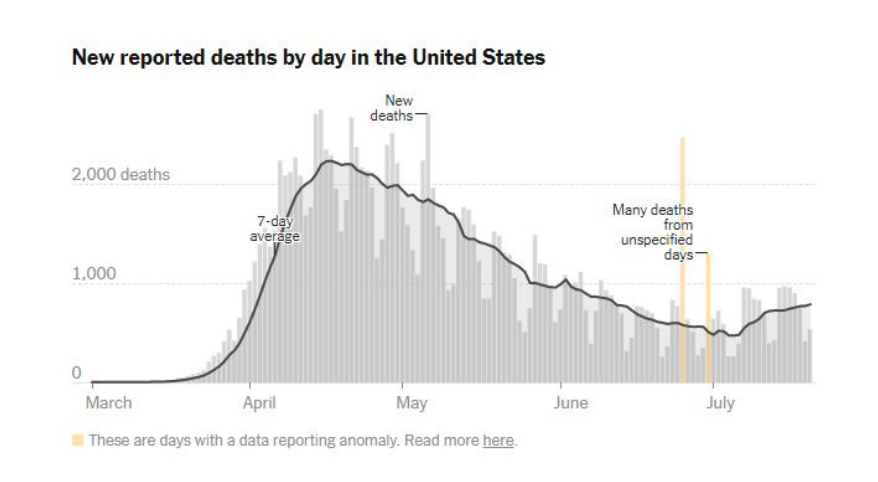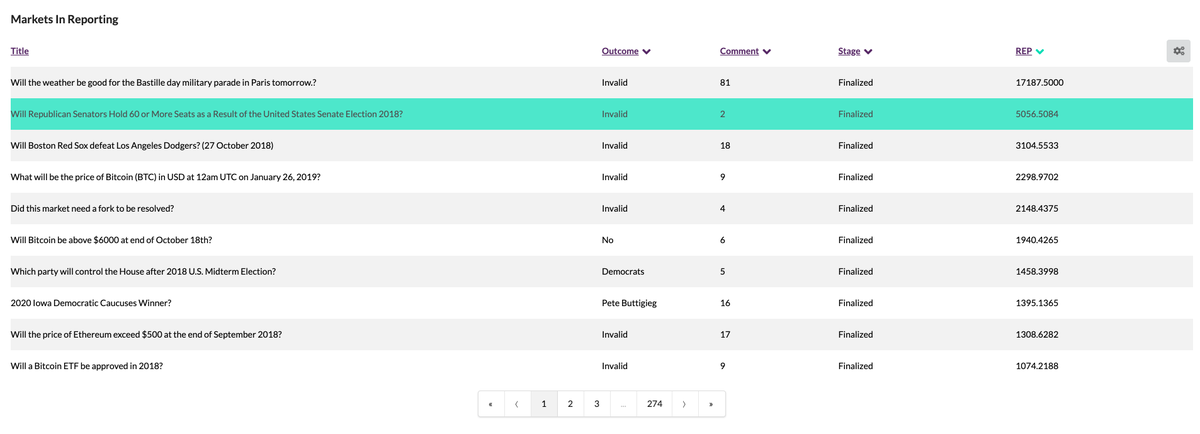Time for a short thread of how the "oracle problem" is solved in @Omen_eth in a fully decentralized way. https://twitter.com/RealitioBot/status/1284235303109066752
Every market in Omen is linked to a question on @RealitioProject. Once the resolution time comes anyone can resolve that question to whatever outcome they want by posting a small Ether bond (min 0.01 ETH)
Anyone can now overwrite this answer by posting a bond that is at least double the previous bond. This process can continue until for 24h no new answer is posted. Those who in the end staked for the winning outcome win the ETH from the other side.
However - at any time it is possible to end this process and let it be settled by an arbitrator by paying an arbitration fee. In the case of Omen, the default arbitrator is the @Kleros_io court, and the fee to call it is 32ETH.
In this case, anyone can provide evidence for their side of the argument. In the end, it is basically decided by a token vote/ Schelling point game of those that stake the Kleros token.
Find historic court decisions here: http://kleroscan.com/
Find historic court decisions here: http://kleroscan.com/
Currently, we are seeing a first instance where at least on the lower @RealitioProject level there is a dispute. The question was about "Will there be a day with at least 1000 reported Corona death in the US in the first 14 days of July?"
The dispute is now likely that some sources report >1000 death and some below. Some might argue that this is an issue with Omen that market only has a "title" and now further specifications about e.g. a source. I think this a feature and not a bug.
It lowers the bar for market creations and instead of putting the burden on the individual market creation, I expect a set of platform rules to arise that will set guidelines for those cases. And of course, a history of past decisions will grow.
First guidelines/rules here: http://omen.eth.link/rules.pdf Next iteration already in the making here: https://daotalk.org/t/omen-market-resolution-rules/1653
As those default rules evolve it will keep market creation simple and create consistency across markets which will make it for users simpler to know the rules.
As those default rules evolve it will keep market creation simple and create consistency across markets which will make it for users simpler to know the rules.
It is escalating further. We might soon see the full process including the Kleros court: https://twitter.com/realitiobot/status/1284554758389284864?s=21 https://twitter.com/realitiobot/status/1284554758389284864
. @Omen_eth is having it "invalid markets" @AugurProject moment right now. A important precedence will be set potentially in the next hours.
I argue for: Increase usability by resolving to what most people would expect and not go by the "letter of the law". https://daotalk.org/t/omen-the-first-critical-distpute/1714/8
I argue for: Increase usability by resolving to what most people would expect and not go by the "letter of the law". https://daotalk.org/t/omen-the-first-critical-distpute/1714/8
We are going into the next round. Next step would be either a 82 ETH bond on “yes” or “invalid” or someone paying the 32 ETH arbitration fee to call the @Kleros_io court.
https://twitter.com/realitiobot/status/1284907909709565952?s=21 https://twitter.com/realitiobot/status/1284907909709565952
https://twitter.com/realitiobot/status/1284907909709565952?s=21 https://twitter.com/realitiobot/status/1284907909709565952
Alright - the arbitrator was called - so it seems we will have the largest court case in Ethereum history so far now on the @Kleros_io general court.
Question:
Was there a day with at least 1000 reported Corona death in the US in the first 14 days of July?
Yes or No?
Question:
Was there a day with at least 1000 reported Corona death in the US in the first 14 days of July?
Yes or No?
The majority of sources (including CDC, WHO and the immediate result if you ask google) indicates reports numbers below. But there is one source reporting above.
How would you expect a prediction market to decide in this situation? How would you expect a court to rule?
How would you expect a prediction market to decide in this situation? How would you expect a court to rule?
here is the address that triggered arbitration:
https://etherscan.io/address/0x6a37243bb64d472cfee4716d6f1efb81a28332b7
This address and all the addresses it received ETH from have been buying PNK tokens in the last days.
https://etherscan.io/address/0x6a37243bb64d472cfee4716d6f1efb81a28332b7
This address and all the addresses it received ETH from have been buying PNK tokens in the last days.
here you can see the case in the Kleros court: https://court.kleros.io/cases/302
Here you can see the addresses of the jurors drawn:
http://kleroscan.com/dispute/302
Here you can see the addresses of the jurors drawn:
http://kleroscan.com/dispute/302
Now we do have a prediction market on the outcome of the court decision:
https://omen.eth.link/#/0xf45d703b2f695280e21605dbee2db5ebcb08d469
And the 2 camps are going different routes to make their case:
"Yes side":
"No side":
http://case302.eth.link/
https://omen.eth.link/#/0xf45d703b2f695280e21605dbee2db5ebcb08d469
And the 2 camps are going different routes to make their case:
"Yes side":
"No side":
http://case302.eth.link/
Voting has started and I want to lay out and I want to lay out why "no" is the better outcome for Omen. Here is an argument for the "yes" side: https://twitter.com/thibauld/status/1285752174933422081?s=20
It basically says: there is uncertainty in the question which leaves room to argue for "yes" so it should resolve to "yes" to "educate people". I think this is wrong for 3 reasons:
1) It could easily be flipped: "There is room to interpret for "no" so the "yes" side should
1) It could easily be flipped: "There is room to interpret for "no" so the "yes" side should
be educated to ask the question more clearly"
2) The idea that it is possible to remove uncertainty by asking the question more clear. After ~7 years of experience with prediction markets I can say that this will not be the case. Just to give one example:
2) The idea that it is possible to remove uncertainty by asking the question more clear. After ~7 years of experience with prediction markets I can say that this will not be the case. Just to give one example:
Let's say the NY Times would be selected as source. In there graph they have days (yellow) with reports from the past and already marked as "anomaly". How would the oracle deal with this?
3) It is the role of the Arbitrator to "educate users": This is a severe misunderstanding of the role of the arbitrator. In my view the arbitrator is first and foremost a "service provider". They get paid a fee to provide a useful service for "Omen"/" http://Realit.io "
@RealitioProject does not have a extra field to add a source or a longer text description. You only can have a "title" that need to ask the full question. In this context it seems clear to me that a useful arbitrator for this format needs to ask "what was meant by the question"
and can not expect that details about the resolution process can be specified in this short title. Therefore I think for this concept to work a court needs to be found that is willing to ask for "what is meant by the question".
Last comment: @AugurProject went the route in their arbitration history to declare a lot of market "invalid". You might argue - that is "educates users" to ask better questions. I'd argue: it simply sucks for users and Augur should change that.
This is the conclusion you can easily come to, if you don't go for the: "accept ambiguity, answer by common sense/ what was meant by the question" approach: https://twitter.com/AndrewSportX/status/1286109485971525632?s=20

 Read on Twitter
Read on Twitter


